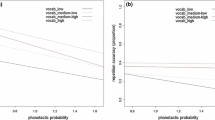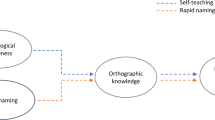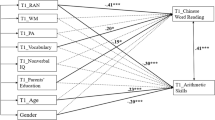Abstract
The extent to which children's performance on tests of nonword repetition is constrained by phonological working memory and long-term lexical knowledge was investigated in a longitudinal study of 70 children tested at 4 and 5 years of age. At each time of testing, measures of nonword repetition, memory span, and vocabulary knowledge were obtained. Reading ability was also assessed at 5 years. At both ages, repetition accuracy was greater for nonwords of high- rather than low-rated wordlikeness, and memory-span measures were more closely related to repetition accuracy for the low-wordlike than for the high-wordlike stimuli. It is argued that these findings indicate that nonword repetition for unwordlike stimuli is largely dependent on phonological memory, whereas repetition for wordlike items is also mediated by long-term lexical knowledge and is therefore less sensitive to phonological memory constraints. Reading achievement was selectively linked with earlier repetition scores for low-wordlike nonwords, suggesting a phonological memory contribution in the early stages of reading development. Vocabulary knowledge was associated with repetition accuracy for both low- and high-wordlike nonwords, consistent with the notion that lexical knowledge and nonword repetition share a reciprocal developmental relationship.
Similar content being viewed by others
References
Baddeley, A. D. (1978). Working memory and reading. In P. A. Kolers, M. E. Wrolstad, & H. Bouma (Eds.),Processing of visible language (Vol. 1, pp. 355–370). New York: Plenum Press.
Baddeley, A. D., Papagno, C., &Vallar, G. (1988). When long-term learning depends on short-term storage.Journal of Memory & Language,27, 586–596.
Baddeley, A. D., &Wilson, B. A. (1993). A developmental deficit in short-term phonological memory: Implications for language and reading.Memory,1, 65–78.
Brady, S. (1991). The role of working memory in reading disability. In S. A. Brady & D. P. Shankweiler (Eds.),Phonological processes in literacy (pp. 129–151). Hillsdale, NJ: Erlbaum.
Brady, S., Shankweiler, D., &Mann, V. (1983). Speech perception and memory coding in relation to reading ability.Journal of Experimental Child Psychology,35, 345–367.
Brown, G. D. A., & Hulme, C. (in press). Modelling item length effects in memory span: No rehearsal needed?Journal of Memory & Language.
Bryant, P. E., Bradley, L., Maclean, M., &Crossland, J. (1989). Nursery rhymes, phonological skills and reading.Journal of Child Language,16, 407–428.
Crain, S., Shankweiler, D., Macaruso, P., &Bar-Shalom, E. (1990). Working memory and comprehension of spoken sentences: Investigations of children with reading disorders. In G. Vallar & T. Shallice (Eds.),Neuropsychological impairments of short-term memory (pp. 477–508). Cambridge: Cambridge University Press.
Crano, W. D., &Mellon, P. M. (1978). Causal influence of teachers' expectations on children's academic performance: A cross-lagged panel analysis.Journal of Educational Psychology,70, 39–49.
Dunn, L. M., &Dunn, L. M. (1982).British Picture Vocabulary Scale. Windsor, U.K.: NFER-Nelson.
Ellis, N. C., &Large, B. (1988). The early stages of reading: A longitudinal study.Applied Cognitive Psychology,2, 47–76.
France, N. (1981).Primary reading test (rev. ed.). Windsor, U.K.: NFER Nelson.
Frauenfelder, U. H., Baayen, R. H., Hellwig, F. M., &Schreuder, R. (1993). Neighborhood density and frequency across languages and modalities.Journal of Memory & Language,32, 781–804.
Frith, U. (1985). Beneath the surface of developmental dyslexia. In K. E. Patterson, J. C. Marshall, & M. Coltheart (Eds.),Surface dyslexia (pp. 301–330). Hove, U.K.: Erlbaum.
Gathercole, S. E. (1990). Working memory and language development: How close is the link?The Psychologist,2, 57–60.
Gathercole, S. E., &Adams, A.-M. (1993). Phonological working memory in very young children.Developmental Psychology,29, 770–778.
Gathercole, S. E., & Adams, A.-M. (in press). Children's phonological working memory: Contributions of long-term knowledge and rehearsal.Journal of Memory & Language.
Gathercole, S. E., &Baddeley, A. D. (1989). Evaluation of the role of phonological STM in the development of vocabulary in children: A longitudinal study.Journal of Memory & Language,28, 200–213.
Gathercole, S. E., &Baddeley, A. D. (1990a). Phonological memory deficits in language-disordered children: Is there a causal connection?Journal of Memory & Language,29, 336–360.
Gathercole, S. E., &Baddeley, A. D. (1990b). The role of phonological memory in vocabulary acquisition: A study of young children learning arbitrary names of toys.British Journal of Psychology,81, 439–454.
Gathercole, S. E., &Baddeley, A. D. (1993a). Phonological working memory: A critical building block for reading development and vocabulary acquisition?European Journal of the Psychology of Education,8, 259–272.
Gathercole, S. E., &Baddeley, A. D. (1993b).Working memory and language. Hove, U.K.: Erlbaum.
Gathercole, S. E., Willis, C. S., Baddeley, A. D., &Emslie, H. (1994). The Children's Test of Nonword Repetition: A test of phonological working memory.Memory,2, 103–127.
Gathercole, S. E., Willis, C. [S.], Emslie, H., &Baddeley, A. D. (1991). The influences of number of syllables and word-likeness on children's repetition of nonwords.Applied Psycholinguistics,12, 349–367.
Gathercole, S. E., Willis, C. S., Emslie, H., &Baddeley, A. D. (1992). Phonological memory and vocabulary development during the early school years: A longitudinal study.Developmental Psychology,28, 887–898.
Hitch, G. J., &Halliday, M. S. (1983). Working memory in children.Philosophical Transactions of the Royal Society: Series B,302, 423–430.
Kamhi, A. G., &Catts, H. W. (1986). Toward an understanding of developmental language and reading disorders.Journal of Speech & Hearing Disorders,51, 337–347.
Kamhi, A. G., Catts, H. W., Mauer, D., Apel, K., &Genting, B. F. (1988). Phonological and spatial processing abilities in languageand reading-impaired children.Journal of Speech & Hearing Disorders,53, 316–327.
Marsh, G., Friedman, M., Welch, V., &Desberg, P. (1981). A cognitive-developmental theory of reading acquisition. In G. E. MacKinnon & T. G. Waller (Eds.),Reading research: Advances in theory and practice. New York: Academic Press.
Marslen-Wilson, W. D. (1987). Function and process in spoken word recognition.Cognition,8, 1–71.
McCarthy, D. (1970).McCarthy Scales of Children's Abilities. New York: Psychological Corporation.
McClelland, J. L., &Elman, J. L. (1986). The TRACE model of speech perception.Cognitive Psychology,18, 1–86.
Papagno, C., Valentine, T., &Baddeley, A. D. (1991). Phonological short-term memory and foreign-language vocabulary learning.Journal of Memory & Language,30, 331–347.
Papagno, C., &Vallar, G. (1992). Phonological short-term memory and the learning of novel words: The effects of phonological similarity and item length.Quarterly Journal of Experimental Psychology,44A, 47–67.
Raven, J. (1984).Raven's Coloured Progressive Matrices. London: H. K. Lewis & Co.
Schweikert, R. (1993). A multinomial processing tree model for degradation and redintegration in immediate recall.Memory & Cognition,21, 168–175.
Service, E. (1992). Phonology, working memory, and foreignlanguage learning.Quarterly Journal of Experimental Psychology,45A, 21–50.
Snowling, M., Goulandris, N., Bowlby, M., &Howell, P. (1986). Segmentation and speech perception in relation to reading skill: A developmental analysis.Journal of Experimental Child Psychology,41, 489–507.
Snowling, M. J. (1981). Phonemic deficits in developmental dyslexia.Psychological Research,43, 219–234.
Snowling, M. J., Chiat, S., &Hulme, C. (1991). Words, non-words and phonological processes: Some comments on Gathercole, Willis, Emslie & Baddeley.Applied Psycholinguistics,12, 369–373.
Stanovich, K. E., Cunningham, A. E., &Feeman, D. J. (1984). Intelligence, cognitive skills, and early reading progress.Reading Research Quarterly,19, 278–303.
Stanovich, K. E., Nathan, R. G., &Vala-Rossi, M. (1986). Developmental changes in the cognitive correlates of reading ability and the developmental lag hypothesis.Reading Research Quarterly,21, 267–283.
Taylor, H. G., Lean, D., &Schwartz, S. (1989). Pseudoword repetition ability in learning-disabled children.Applied Psycholinguistics,10, 203–219.
Author information
Authors and Affiliations
Additional information
This work was supported by the Economic and Social Research Council of Great Britain.
Rights and permissions
About this article
Cite this article
Gathercole, S.E. Is nonword repetition a test of phonological memory or long-term knowledge? It all depends on the nonwords. Memory & Cognition 23, 83–94 (1995). https://doi.org/10.3758/BF03210559
Received:
Accepted:
Published:
Issue Date:
DOI: https://doi.org/10.3758/BF03210559




